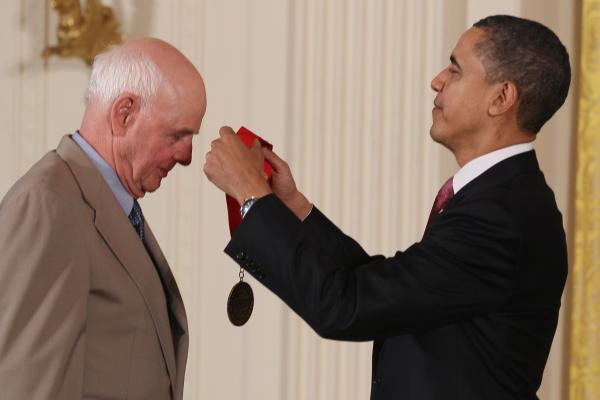On Monday evening, Wendell Berry delivered the 41st annual Jefferson Lecture in the Humanities, sponsored by the National Endowment of the Humanities, at the John F. Kennedy Center in Washington D.C. According to the NEH, this is “the most prestigious honor the federal government bestows for distinguished intellectual achievement in the humanities.”
Read the full text of “It All Turns on Affection” HERE
In front of hundreds, Berry took his place among former recipients (Walker Percy, Toni Morrison, Arthur Miller, John Updike, and many others) to deliver a resonating essay on the beauty of place, imagination, and pleasure, titled “It All Turns on Affection.” The title hinges on E.M. Forster’s 1910 novel Howards End, which Berry said, takes some of its thrust as a “manifesto against materialism.”
Berry began with a story of his grandfather, who in the late 19th century, fully invested himself in the cultivation and harvest of tobacco crop. When it finally came time to leave home to sell his crop, Berry’s father was confronted with the harsh reality of capitalism: someone had formed a monopoly on tobacco, leaving thousands of farmers, like the Berry family, in hardship.
This led Berry to offer a contrast of images: the “boomer” versus the “sticker.” The boomer, he said, desires power and money; they’re willing to monopolize and industrialize without considering the toll it will take on the land and its people. In contrast, the “sticker” is one who values ones connection to the land and people over pillaging its resources and degrading its makeup; a “stickers’” affection for a place speaks to an ethic of intentionality and sustainability over a modern sense of economic growth or progress.
“We should, as our culture has warned us over and over again, give our affection to things that are true, just and beautiful," Berry writes. "When we give affection to things that are destructive, we are wrong. A large machine in a large, toxic, eroded cornfield is not, properly speaking, an object or sign of affection."
Berry spoke to the potential of imagination, advocating that it isn’t an escape into a fantasy realm, but is a visionary faculty grounded in reality; it enables one to see the world and the self most clearly.
He states, “For humans to have a responsible relationship to the world, they must imagine their places in it.”
In this, we recognize the land and its many life forms. As we move to form a connection with a place we begin to develop affection for it. This, Berry believes, enables true economy, one that is neighborly, kind, and conserving.
A true economy is one where people purposefully attend to the goods by which they live; where the local community acts with simplicity and affection to enhance the connection between people and nature. In this, the death of one human fully imagined is no less terrible than the death of a thousand abroad. In this, the hardship of one family affects the close community more painfully than national statistics of struggling farmers.
Ultimately, Berry posited that the modern notion of economy, where progress and innovation is sought at any cost, destroys the possibility for an alternate, neighborly kind of economy.
To an extent, this is what Forster foresaw in Howards End. Forester writes, “It is the vice of a vulgar mind to be thrilled by big business, to think that a thousand square miles are a thousand times more wonderful than one square mile … That is not imagination. No, it kills it.”
In keeping with the occasion, Berry ended by nominating his notion of economy to take an equal place among the pursuits of the arts and humanities.
“I mean, not economics, but economy, the making of the human household upon the earth … This is the economy that the most public and influential economists never talk about, the economy that is the primary vocation and responsibility of every one of us.
“Even so, land and people have suffered together, as invariably they must. Under the rule of industrial economics, the land, our country, has been pillaged for the enrichment, supposedly, of those humans who have claimed the right to own or exploit it without limit. Of the land-community much has been consumed, much has been wasted, almost nothing has flourished.
But this has not been inevitable. We do not have to live as if we are alone.”
To this Berry humbly walked off stage.
And his message resonated powerfully with his audience. Twice Berry was prompted to come back on stage to receive the applause of a full auditorium, standing together to honor his call.
While his story is not universal, the narrative of simple farm life and practice in rural Kentucky has a resounding message. Berry invites us to take part in a way of being that resists the current capitalist model of productivity, competition, and linear achievement. We are asked to imagine a resurrection, to amend the ways we’ve complacently followed along with the destructions that have ravaged our planet and communities, and worsened the ways we commune with nature and each other.
For faithful people, this is a spiritual mandate that permeates our holy texts.
Joshua Witchger is an online assistant at Sojourners.
Got something to say about what you're reading? We value your feedback!
